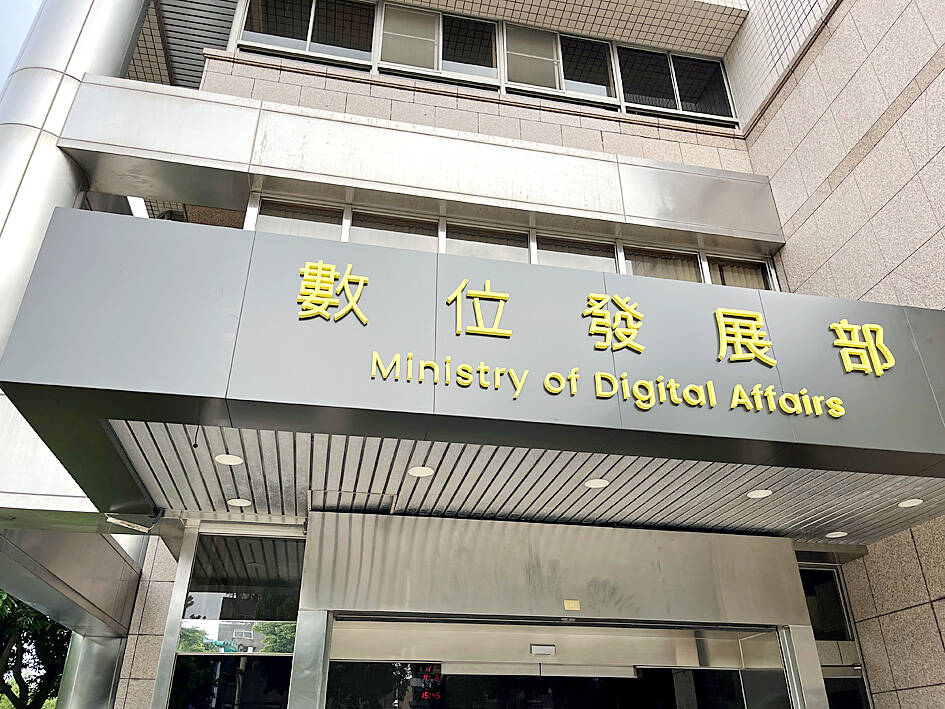The Ministry of Digital Affairs yesterday said that it aims to launch a trial of a digital wallet by the end of this year and that it would accommodate multiple identification documents in one platform.
Aside from banks and insurance firms, the ministry said it hopes that supermarket chain operators could also participate in the trial.
Like a real wallet that a person uses to carry their ID card, National Health Insurance card and other identification documents, the digital wallet would be designed to accommodate multiple cards in one platform, the ministry said.

Photo: Hsu Tzu-ling, Taipei Times
If the digital wallet can be connected to citizen digital certificates and the national health insurance card systems, people could just carry their smartphones when they leave the house, it said.
To win people’s trust in the digital wallet, the ministry would fully disclose the code to the public, Department of Digital Cooperation Director-General Chuang Ying-chih (莊盈志) said.
“This would let the public know two things: first, the operation of the digital wallet does not violate human rights; second, disclosing the program code would allow the public to test and identify problems with the digital wallet and make it safer to use,” Chuang said.
“If hackers can breach the digital wallet, it means the system has problems. Instead of having such problems circulating among hackers, we might as well make the program code public and let everyone have a chance to bolster the safety of the system,” he said.
The types of ID that the digital wallet could carry in the initial phase would probably include citizen digital certificates, business certificates of corporations and certificates of professional skills, Chuang said.
The ministry would try to connect the digital wallet to the systems for driver’s licenses and national health insurance cards, he said.
The digital wallet project has been warmly received by banks and insurance firms, as it would greatly save the time and resources they spend in verifying the identities of their customers, Chuang said.
The system would also help people when they pick up items purchased online at convenience stores, he said.
“Consumers need to present their ID cards. To accumulate points in their membership accounts, they need to give their phone number and must verify it on screen. This could lead to leaks of personal data. We will try to allow consumers to use the digital wallet in convenience stores,” he said.
The digital wallet is to be tested in a sandbox in next month and a trial version is expected to be launched in December, the ministry said.

NATIONAL SECURITY THREAT: An official said that Guan Guan’s comments had gone beyond the threshold of free speech, as she advocated for the destruction of the ROC China-born media influencer Guan Guan’s (關關) residency permit has been revoked for repeatedly posting pro-China content that threatens national security, the National Immigration Agency said yesterday. Guan Guan has said many controversial things in her videos posted to Douyin (抖音), including “the red flag will soon be painted all over Taiwan” and “Taiwan is an inseparable part of China,” while expressing hope for expedited “reunification.” The agency received multiple reports alleging that Guan Guan had advocated for armed reunification last year. After investigating, the agency last month issued a notice requiring her to appear and account for her actions. Guan Guan appeared as required,

A strong cold air mass is expected to arrive tonight, bringing a change in weather and a drop in temperature, the Central Weather Administration (CWA) said. The coldest time would be early on Thursday morning, with temperatures in some areas dipping as low as 8°C, it said. Daytime highs yesterday were 22°C to 24°C in northern and eastern Taiwan, and about 25°C to 28°C in the central and southern regions, it said. However, nighttime lows would dip to about 15°C to 16°C in central and northern Taiwan as well as the northeast, and 17°C to 19°C elsewhere, it said. Tropical Storm Nokaen, currently

‘NATO-PLUS’: ‘Our strategic partners in the Indo-Pacific are facing increasing aggression by the Chinese Communist Party,’ US Representative Rob Wittman said The US House of Representatives on Monday released its version of the Consolidated Appropriations Act, which includes US$1.15 billion to support security cooperation with Taiwan. The omnibus act, covering US$1.2 trillion of spending, allocates US$1 billion for the Taiwan Security Cooperation Initiative, as well as US$150 million for the replacement of defense articles and reimbursement of defense services provided to Taiwan. The fund allocations were based on the US National Defense Authorization Act for fiscal 2026 that was passed by the US Congress last month and authorized up to US$1 billion to the US Defense Security Cooperation Agency in support of the

PAPERS, PLEASE: The gang exploited the high value of the passports, selling them at inflated prices to Chinese buyers, who would treat them as ‘invisibility cloaks’ The Yilan District Court has handed four members of a syndicate prison terms ranging from one year and two months to two years and two months for their involvement in a scheme to purchase Taiwanese passports and resell them abroad at a massive markup. A Chinese human smuggling syndicate purchased Taiwanese passports through local criminal networks, exploiting the passports’ visa-free travel privileges to turn a profit of more than 20 times the original price, the court said. Such criminal organizations enable people to impersonate Taiwanese when entering and exiting Taiwan and other countries, undermining social order and the credibility of the nation’s